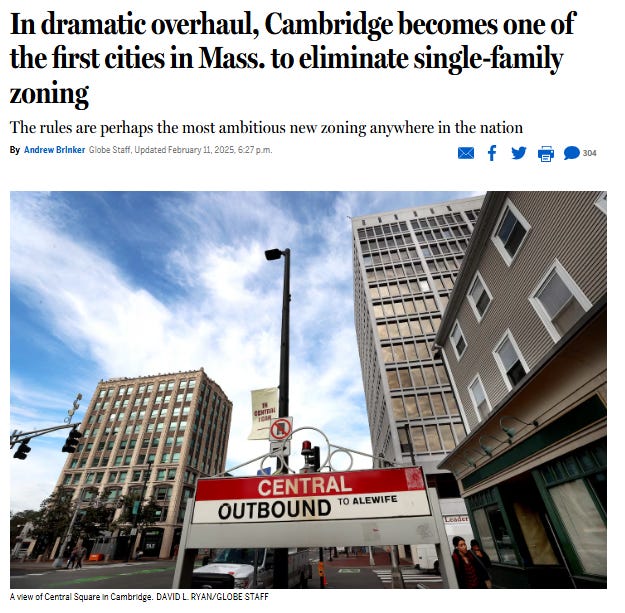Beantown Citybuilding
Can North Carolina cities do what Cambridge, Massachusetts just did?
This is a guest post from pro-housing Citybuilder supporter Dan Bock, who grew up in Cambridge, Massachusetts, and now resides in Durham.
The city of Cambridge, Massachusetts, recently passed a sweeping housing liberalization reform, allowing buildings up to six stories on every residential lot. I hope the reform succeeds. I grew up in Cambridge, and I had become dismayed at the city’s longtime stance on housing. My own family’s story paints a picture of where Cambridge’s decades-long campaign to preserve its neighborhoods’ character succeeded, and where it failed.

My parents met in Cambridge shortly after they each moved there in their early twenties in 1969. My mom had moved from Newton, two towns over, and worked as a freelance journalist. My dad had moved from Los Angeles to start a graduate program, which he soon dropped out of. He worked at the post office for a year and then went to film school.
I was born 10 years later. Cambridge was a great place to grow up. It was safe. It was diverse. The schools were well-regarded. And Cambridge’s reputation for walkability was well-deserved. I walked to elementary school and high school (we didn't have a separate middle school, but I probably would’ve walked there, too). I walked to the grocery store, to Little League games, and to dentist appointments.
Cambridge kids rarely ventured out of Cambridge, but we were vaguely aware of a place across the river called Boston. During breaks from college, I had temp jobs there and commuted via a short ride on the T.

My parents had benefited from living in a place where a young person of modest means could pursue a career without worrying too much about the pay, or could have the financial flexibility to drop out of a degree program that wasn’t a good fit, while still being able to pay the rent.
In 1969, Cambridge was that place. Thirty-three years later, when I graduated from college, it was not.
The intervening years were boom times for Massachusetts and for Cambridge in particular. The Massachusetts Miracle brought the state’s unemployment rate from one of the highest in the country to one of the lowest, and propelled Governor Michael Dukakis to the Democratic nomination for president. In Cambridge, the universities were growing, and biotech companies were thriving, bringing in hordes of highly paid employees who could outbid anyone for housing.
But the housing stock did not keep up. Cambridge's census population was only 1% larger in 2000 than it was in 1970, and it wasn't because nobody wanted to move in. Tons of people wanted to move in -- and tons more wanted to move out of their parents' houses into their own places – but new housing was not being built for them.
Cambridge decided in the 20th century, as many other cities and towns did, that it was a high priority to maintain the architectural character of its neighborhoods. It enacted a combination of zoning and historic preservation rules that made it impractical to build nearly anything new.
The effort was a success.
Walk around our neighborhood in 2000, and the only differences you'd see from 1970 are that more of the houses had fresh coats of paint, and the cars parked on the street were much fancier. Another 25 years later, there are some slight changes - accessory dwelling units are legal now, for example, and a few have been built - but most buildings are the same as always.
But while the city succeeded in preserving the character of the architecture, the character of the people who could afford to live in the neighborhood completely changed.
As someone from there, I definitely get why the city would want to keep neighborhoods as they are. What was built (mostly around the turn of the century, in a near-complete absence of land use laws) was truly great. The mix of triple-deckers, large duplexes, and other dense housing types, with just a small number of single-family homes, makes for a beautiful neighborhood and allows for reasonable backyards as well as transit and walkability.
But policymakers must consider the costs of these policies as well as the benefits. For me, the cost was that living on my own as a broke young adult in my hometown was completely out of the question. After college graduation, I moved to North Carolina, and I’ve been here ever since.
The Cambridge of the past is a cautionary tale. Cities can prevent some kinds of change. But the consequence of preventing housing is that the city becomes an unwelcoming place, even for people who grew up there.
The Cambridge of the future can be different. The new housing policy pushes the city in the direction of restoring its legacy as a place of opportunity.
That’s great. Other cities, including our high-demand college towns in North Carolina, should take inspiration from this example and consider bold, ambitious changes that can make them the dynamic and welcoming places we need them to be.
___
Dan Bock is an amateur chess player, distance runner, and professional software engineer who lives in Durham, N.C., with his wife and two children. His mother is the former mayor of Cambridge, and his father is an Emmy Award-winning sound mixer.





Hey @erickronberg, what would happen if Atlanta allowed 6 stories citywide?